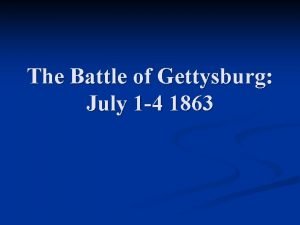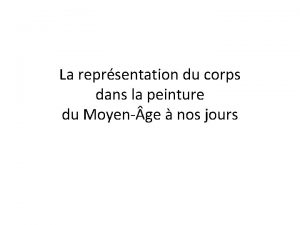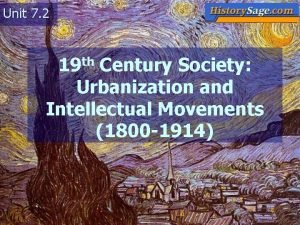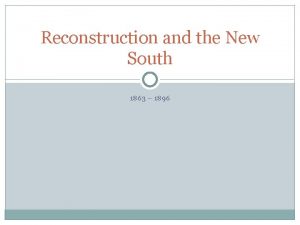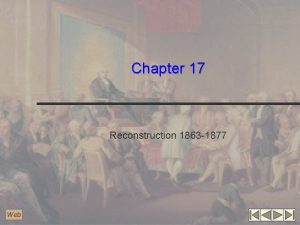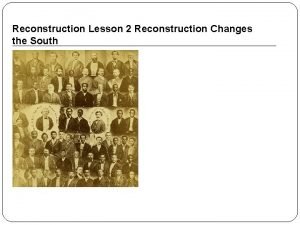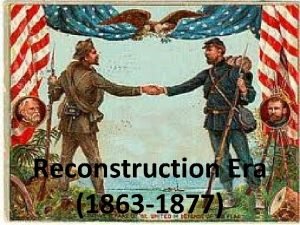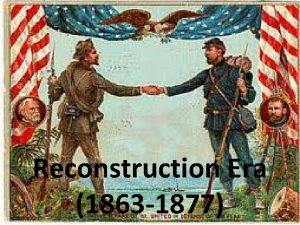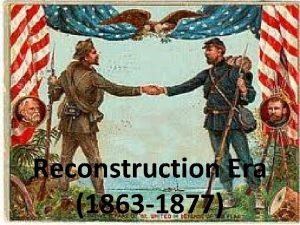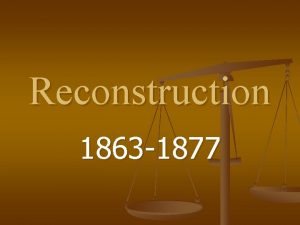Chapter 16 Reconstruction and the New South 1863











- Slides: 11

Chapter 16: Reconstruction and the New South. 1863 to 1896

Section 1: Rebuilding the Nation • After the Civil War, the South lay in ruins. Their government was destroyed as well as their cities and railroads. Confederate money was worthless. Free labor was gone, as the 4 million slaves were freed. In trying to come up with plans to fix the South, President Lincoln had a very important task. • President Abraham Lincoln’s 10% Plan to reunite the nation was too lenient on the South. Lincoln wanted to grant “amnesty” to the South. Congress did not agree. His famous quote about his views on Reconstructing the nation was “With Malice toward none, with charity for all. ” • Congress’ Wade-Davis Bill was too hard on the South, and a compromise needed to be made. Before that could happened, President Lincoln was assassinated by the scoundrel John Wilkes Booth at Ford’s Theater in Washington, DC. • To help the freed slaves, the Freedmen’s Bureau was established. It was meant to provide education, relief, help the unemployed, and gave legal help to ex-slaves struggling in the South. It was underfunded and unappreciated by many members of Congress.

The Assassination The Wanted Poster

Section 2: The Battle Over Reconstruction • President Andrew Johnson faced Reconstruction after Lincoln’s death. His plan to reunite the nation was seen as too easy on the South and he was not trusted by many in Congress. Republicans in Congress pushed through the 13 th Amendment which freed the slaves, and the 14 th which gave slaves the rights of citizens in the US. • At this time, Radical Republicans took over Reconstruction themselves and were very hard on the South, punishing each state for rebelling against the US government. Their methods allowed African Americans to run for office and hold important positions in government. • Impeachment charges were brought against President Johnson in 1868. Impeachment simply means he was brought up on charges for violating the Tenure of Office Act. He was really impeached because Congress did not think he would enforce laws they were passing over his veto. He remained in office, saved by the last vote. • • Unfortunately this led to the rise of the Ku Klux Klan. They used terror and intimidation to ensure black men and white republicans would not vote or hold office in the South. Despite the efforts of Congress to get rid of the KKK, groups like them existed throughout the country to keep freed slaves in check.

The Impeachment Trial of Andrew Johnson

Section 3: The End Of Reconstruction • As Reconstruction dragged on, many Northerners began to lose interest in it, especially the cost. Also, President Grant made many appointments to government positions that proved to be poor. People began to lose faith in Republicans who held office for so long during the Civil War and beyond. • Southern states began to strip away more rights of freed men and Northern troops were not enforcing laws passed by Congress. With the election of 1876, Republicans and Democrats made a deal to settle the election and end Reconstruction. President Rutherford B Hayes did not win the popular vote, and there were some electoral votes that were disputed by Congress. They agreed to make him President as long as Reconstruction ended. He promptly removed all federal troops from the South ending Reconstruction after 11 years. The map at the bottom of page 559 of the textbook shows how each state voted and which states had disputed electoral votes. • With the end of Reconstruction came the loss of more and more rights of freed slaves. More laws were passed to restrict their rights. These laws were enforced mostly around voting. Black men had to pay a poll tax to vote, and/or had to take a literacy test. These laws, plus the grandfather clause, restricted voting rights. But worse than that were the new Jim Crow segregation laws passed in the South. • The Supreme Court case Plessy v. Ferguson upheld the idea that “separate but equal” facilities were okay as long as the white and “colored” facilities were the same. As you can probably guess, they were never the same. • .

Sharecropping: A Cycle of Poverty

Vocabulary • Poll Tax: A tax people had to pay before voting • Literacy Test: An exam to determine whether a person could read and write • Amnesty: A group pardon • Segregation: The forced separation of races • Black Codes: Laws used by southern state to restrict the rights of freed slaves

Famous People • Abraham Lincoln: President during and after the Civil War, he was assassinated before he could help reunite the nation during Reconstruction • John Wilkes Booth: The scoundrel who assassinated President Lincoln, he was an actor and Confederate sympathizer who was very angry at the thought of freed men working in the South and the outcome of the Civil War • “With malice toward none, with charity for all, with firmness in the right, as God gives us to see the right, let us strive on to finish the work we are in, to bind up the nation's wounds. ”-Abraham Lincoln

Question • Was Reconstruction successful or did it cause more problems in the South?

Citations • Photo of Richmond, VA. http: //www. wwnorton. com/college/history/america 10/ch/16/docum ents. aspx? sel. Tab=2#titles • Wanted Poster http: //historynewsnetwork. org/article/161139 • Lincoln Cartoon http: //www. history. com/topics/abraham-lincolnassassination • Impeachment http: //www. pbs. org/wgbh/americanexperience/features/grantimpeachment/ • Sharecropping http: //ushistoryvocab. weebly. com/sharecropping. html


